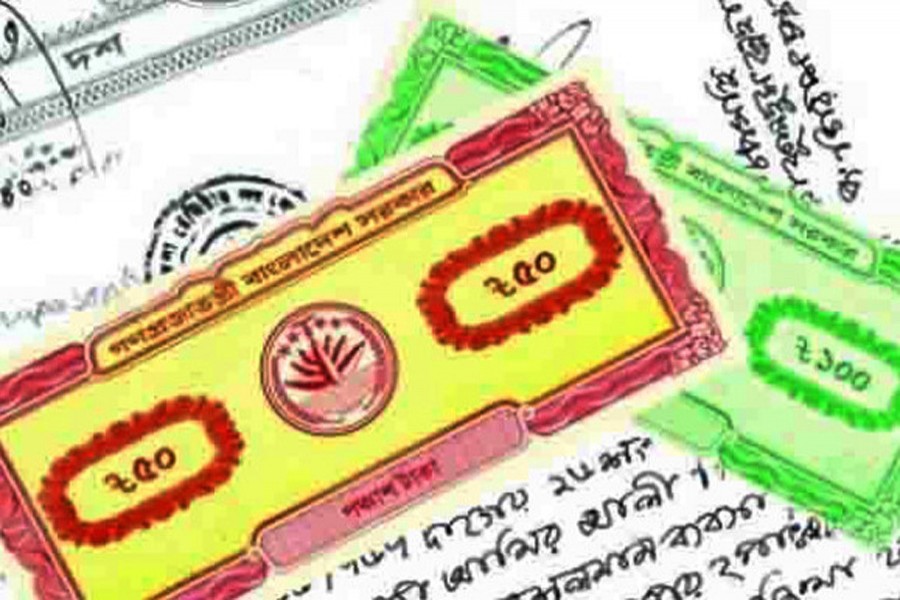A major project for digitising the country's manually-managed land registration system has remained almost shut for years due to reasons hitherto unknown, officials said.
But sources at the Ministry of Law, Justice and Parliamentary Affairs said the ministry might go for scrapping the project to begin the whole process afresh.
Because of the reviving plan, the functioning of the project has been halted for over five years, although major task of the automation - development of software - is completed, according to them.
Such developments have created enough doubt among the service recipients and anti-graft activists regarding the service provider's willingness to ensure transparency in the country's manual deed registration system.
They said this kind of delay in the process of ensuring good governance in the land sector will keep scopes open for continued bribery, extortion and other forms of graft in the government's second largest revenue source after the National Board of Revenue (NBR).
Talking to the FE, Inspector General of Registration (IGR) Khan Md. Abdul Mannan said they started implementing the piloting from 2012 with their own expenses to get the required level of funds from GoB (Government of Bangladesh) before its replication all over the country.
"But we did not get the required funds (Tk 2.0 billion) even after repeated efforts. The ministry concerned has been dealing the matter, and it can give the answer," he added.
The government took the move for automation at five land-registry offices in the country for piloting in early 2012 before its nationwide replication, so that the citizens can get rid of hassles and harassments caused by irregularities in the registration process.
A consortium of three IT (information technology) firms - Business Automation Ltd, DataSoft Systems Bangladesh Ltd and Info Consult Ltd - was given the responsibility of developing the necessary software under the project. An agreement on the task was signed in December 2012.
But the process has remained almost stalled since the last half of 2013 soon after development of the software worth Tk 10 million. It had a major feature of delivering original deeds within a day, as people need to wait for several years and spend additional amounts of money to avail the original one.
Seeking anonymity, an IGR official, involved with the project from the very beginning, expressed his frustration over the slow progress, and said the fund shortage was nothing but a lame excuse.
He said fund shortage should not be cited as a problem for a public-entity like IGR, which collects revenue amounting to billions of taka each year.
"The problem mainly lies on the mindset, as many officials and employees think the automation could put their jobs and scopes of extra earning at risk," he added.
Terming the project a GoB-funded one, he said the Ministry of Finance (MoF) suggested them initiating its proceedings with Tk 0.5 billion of the IGR fund. It was basically generated through the service charge that the service holders need to pay before receiving the registration service.
MoF also assured them of paying the remaining funds, and released a part (Tk 100 million) of the promised fund in two phases in the financial years (FY) 2014 and 2015, which could be easily used to complete the piloting.
"Without doing that, IGR sent back the funds to the ministry concerned. I think there is something behind the scene," he added.
Under the software, the deed-writers will continue their jobs and the record copiers will scan the deeds before printing those out. A copy of the original deeds will instantly be handed over to the owner, another copy will be automatically sent to the office of AC (Assistant Commissioner) Land Office, while the final one will be stored in the central server.
When contacted, Minister for Law, Justice and Parliamentary Affairs Anisul Huq said they will start scrutinising all the output, achieved so far under the project, from next month (March).
"If the software fulfils our requirements for providing faster and hassle-free service delivery, we will go with the proceedings. Otherwise, we have to revive it," he added.
Executive Director of Transparency International Bangladesh (TIB) Dr. Iftekharuzzaman said complete and robust digitisation can radically transform the land registration and related services, which has been one of the worst corruption-affected sectors in the country.
He also said various initiatives for digitisation have failed so far, largely due to lack of political pledges and internal resistance from within system by a section of officials and staff, who in collusion with various unscrupulous agents benefit from widespread corruption.
Now given the Prime Minister's loud and clear declaration of 'zero tolerance' against corruption coupled with the new land minister's pronouncements for ensuring integrity in his ministry, people will expect things to change soon, he noted.
"Much will depend on whether the minister in collaboration with his team of officials can genuinely deliver on the promises with full integrity and without fear or favour, failing to do which will not break the vicious circle."
He further added that the minister will hopefully remember that despite long years of distrust, people's expectations have now been raised, and they do not want to see yet another round of simple political rhetoric.


